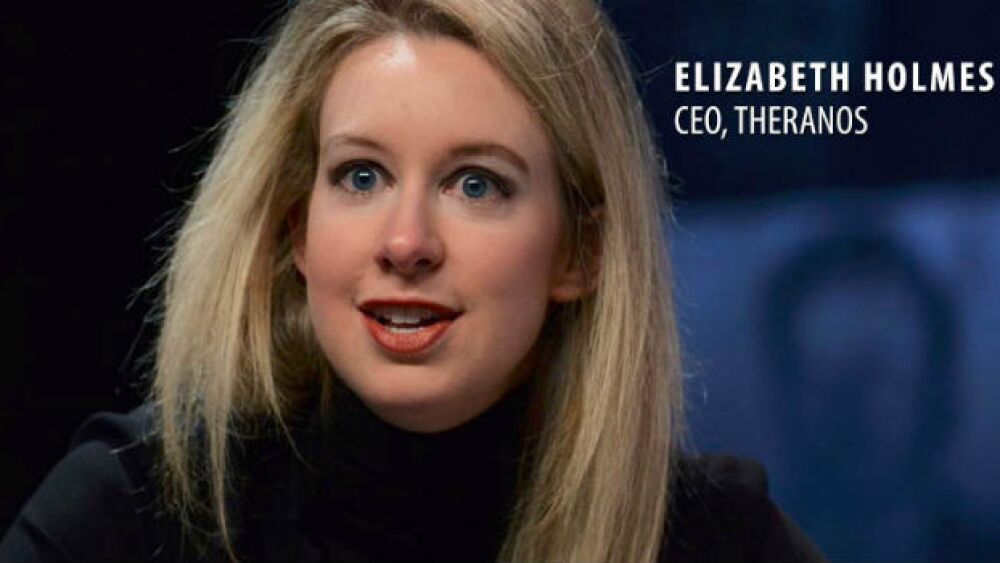If convicted Holmes and Balwani face a maximum sentence of 20 years in prison.
A federal grand jury dropped the hammer on Theranos founder Elizabeth Holmes and former company president Ramesh “Sunny” Balwani Friday afternoon. The two were indicted with criminal charges, including two counts of conspiracy to commit wire fraud and nine counts of wire fraud.
The charges in the indictment, which was unsealed today, stem from allegations Holmes and Balwani engaged in a multi-million dollar scheme to defraud investors, and a separate scheme to defraud doctors and patients, the Department of Justice said. According to the indictment, Holmes and Balwani used advertisements and solicitations to encourage and induce doctors and patients to use Theranos’ blood testing laboratory services, despite the fact that Holmes and Balwani knew the company’s proprietary device was “not capable of consistently producing accurate and reliable results for certain blood tests,” the government said. Additionally, the government said the tests performed on Theranos technology were “likely to contain inaccurate and unreliable results.”
Holmes founded Theranos at the age of 19. She had a vision, so she said throughout the years, to change healthcare by providing patients with their own diagnostic information through the blood-testing devices – devices that have never worked as well as the company hoped or claimed.
If convicted Holmes and Balwani face a maximum sentence of 20 years in prison, and a fine of $250,000, plus restitution, for each count of wire fraud and for each conspiracy count. Both Balwani and Holmes appeared in court before for their initial appearances and entered pleas of not guilty. The case has been assigned to the U.S. District Court Judge Lucy H. Koh for further proceedings. Theranos has not issued a statement regarding the indictment.
Balwani’s attorney Jeffrey Coopersmith, a partner with Davis Wright Tremaine, said Balwani is innocent and “looks forward to clearing his name at trial.” In a statement to BioSpace, Coopersmith said Balwani did not defraud customers or investors.
“All Mr. Balwani did was put his heart and soul, and millions of dollars of his own money, toward changing the face of healthcare by giving these people access to cost-effective blood tests so they could take charge of their own health and monitor changes for signs of the disease,” Coopersmith said.
In March Holmes and Balwani were charged with massive fraud by the U.S. Securities and Exchange Commission. From 2013 to 2015 Holmes and Balwani raised more than $700 million from investors through what the SEC called “years-long fraud” in which they exaggerated or lied about the efficacy of the company’s proprietary technology and the state of its finances. In its complaint, the SEC said Holmes and Balwani made false and misleading statements about the efficacy of its technology and about non-existent deals the company had with the government. Holmes agreed to pay a fine of $500,000 to the SEC and has stepped down from her role as CEO. Balwani is fighting the SEC allegations.
The latest criminal indictment goes on to allege that Holmes and Balwani used a combination of direct communications, marketing materials, statements to the media, financial statements, models, and other information in order to defraud potential investors. At its height, Theranos – a company that despite its failings and secrecy had a valuation of about $9 billion at one point due to Holmes’ ability to convince investors to fund her company.
Friday’s indictment mirrors comments made by former Theranos employees who claimed in a recent 60 Minutes report that the company performed a “bait and switch” routine with its blood testing claims. The company claimed to have conducted tests on its proprietary equipment, but in reality used commercial devices, the former employees charged. The federal indictment makes similar claims. The indictment alleges that when Holmes and Balwani made marketing presentations in order to solicit investments that the duo knew “that many of their representations about the analyzer were false.”
“For example, allegedly, Holmes and Balwani knew that the analyzer, in truth, had accuracy and reliability problems, performed a limited number of tests, was slower than some competing devices, and, in some respects, could not compete with existing, more conventional machines,” the Department of Justice said in its statement Friday.
Not only did the company mislead investors in order to gain hundreds of millions of dollars in financing, the false claims “conspiracy” around those “misled doctors and patients about the reliability of medical tests that endangered health and lives,” Special Agent in Charge John F. Bennett, said in a statement.
The indictment said that Theranos knew its claims regarding assortment of blood tests its Edison machine could conduct from one drop of blood were false. The Theranos device “was not capable of consistently producing accurate and reliable results for certain blood tests, including the tests for calcium, chloride, potassium, bicarbonate, HIV, Hba1C, hCG, and sodium,” the government said. The inaccuracies of the Theranos blood-testing equipment have already sparked a number of lawsuits against the company. In 2016 an investigation into the company’s Newark, Calif. blood testing laboratory revealed egregious practices, which led to the company voiding two years-worth of data sent to customers. Theranos shut down that site and the investigation also led to Theranos shuttering its lab facilities across the country.
The federal indictment did not overlook those allegations.
“… the defendants delivered to doctors and patients blood results that were inaccurate, unreliable, and improperly validated. The defendants also delivered to doctors and patients blood test results from which critical results were improperly removed,” the government said.





